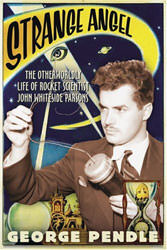
Jack Parsons, born John Whiteside Parsons, grew up in Pasadena, California. Though his family had substantial assets, the depression hit them hard. His life went from being a sole child in a rich family to being just one more member of a shrinking family with quickly disappearing money. An early fascination with space travel from the likes of Jules Verne gave Parsons a great desire to journey off the planet. In pursuing this quest, Parsons took what was then known of black powder and experimented. He varied constituent ingredients, relative compositions and manufacturing techniques. Yet, seldom did he get far from a glorified firecracker. Nevertheless, through trial and error, he was able to manufacture rockets that convinced the military of their usefulness in assisting take-offs (the JATO’s). Not long after, his group launched the first aeroplane flight powered solely by rockets.
With Parsons leading in such a captivating field, a biography would seem likely to focus primarily on accomplishments. Yet Pendle’s work delivers a much broader perspective. Apparently, as much as Parsons wanted to physically fly into the heavens on a rocket machine, he also wanted to journey mentally into other realms. Pendle provides all the details of how Parsons took over the local chapter of religious group, the Thelemas. Free love was in vogue as was much alcohol and the occasional ritual midnight mass. With their leader’s directive being, ‘Do what thou wilt’, there seemed little to inhibit participants’ actions.
These are the two main venues that appear in this book. Rockets and religion. Pendle steps through Parsons’ life from one main event to another. He describes each step in great detail. Housing architecture, real estate deals, and city officials on the take are all background for Parsons’ first appearance in court as an expert witness. Or there’s the Arroyo Seco range with its dry, still air occasionally broken by the blast from experimental rocket engines, swept clean by a deluge of rain, or enjoyed by youths of the area. By giving such a complete view of events and surroundings, Pendle places the reader directly into the times and moments of Parson’s life.
In keeping with this broad view, Pendle expands upon these background notes. There’s a rendition of the life of the Church of Thelema’s leader, Aleister Crowley. Time and again we get portrayals of the residents and architecture of Orange Grove, the street in Pasadena where Parsons spent much of his life. Pendle also shows a good view of some members of Caltech. Tie-ins with local and national science fiction authors abound. Many came to see Parsons or vice versa. There’s even a perception that L. Ron Hubbard’s definitions of Scientology originally came from Hubbard’s association with Parsons.
Perhaps what does get challenging is that these side issues take up so much of the book. There’s California’s culture, Caltech’s inception and growth, the military’s disfavour with rockets and lists of Crowley’s writings. All of these are interesting, some even fascinating, but it’s not always easy to associate with the biography. Further, though there might have been a tight science fiction community at the time, the description of magazine editors and their many stories and editorials makes one think that Pendle had more information than he knew where to insert. As my interest is in the rocketry aspect, I would have preferred more on this topic and less on the other people marginally involved with Parsons.
As well, the missing element in this writing is the lack of conjecture about Parsons himself. There are allusions to a final suicide, or was it an industrial accident? What was it like always being an outsider of Caltech or Aerojet? Why did magick hold such a spell over Parson? With no formal university training, but an encyclopaedic knowledge of chemistry and explosives, why couldn’t or wouldn’t Parsons integrate into research and development groups? These questions arose in my mind, but I kept having more questions and few answers.
Jack Parsons devoted most of his working life to proving and bettering rocket propulsion. His personal life was equally devoted, but to magick and philosophy. George Pendle in his biography Strange Angel colourfully portrays Parsons’ life and the exciting and mystical events that surrounded him. Some people were just never meant to be normal, and the rocket industry can thank Parsons for being one of those people.
Review by Mark Mortimer
Read more reviews online, or purchase a copy from Amazon.com.
